The Chemistry of Connection
August 03, 2022
By Adrienne Egolf
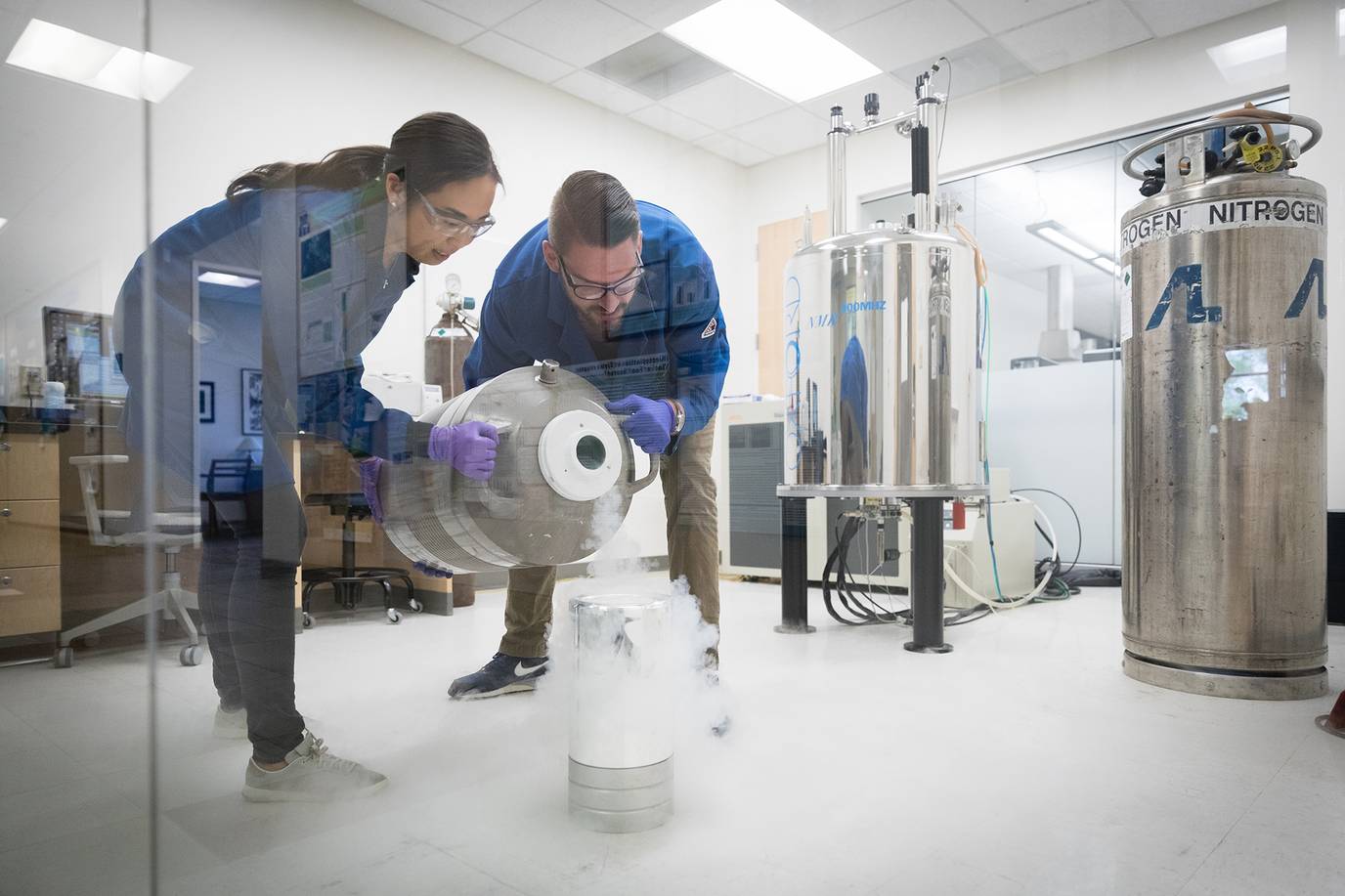
For Ellane Park, building relationships with her students is the foundation of a successful science education.
Chemistry professor Ellane Park has a way of talking about her work that makes even the most complex aspects seem approachable. “Very broadly, I study nanotechnology,” she says. “All that means is it’s the study of very, very small things.”
Of course, it’s more complicated than that. Her research involves gold nanoparticles, which can be used in diagnostic devices, like the at-home tests used to diagnose COVID-19 or in therapeutic treatments for more targeted drug delivery.
“The science behind nanotechnology can provide a way to deliver drugs through these tiny vessels that we create for a more targeted approach for drug delivery—but that’s just one area where it’s useful,” she says. “Part of what thrills me about my field of research is the mystery behind it, but we have scientific tools to solve it. Identifying an unknown—I love this idea.”
It’s a rigorous field, and Park’s ability to break it down only reiterates her expertise. Her relatability is part of why her classes are often filled with science and non-science majors alike. In fact, she’s just as likely to turn up at a student’s basketball game as she is to a lab, and she says the opportunity to practice conversational Spanish with students on campus is one of her favorite things about teaching at Rollins. For Park, teaching is about making connections. She’s even trying to rebrand her “office hours” as “student hours.”
“You don’t need to have a chemistry question to come talk to me,” says Park. “I just want to hear your story, how you got here—let’s start with that. I think that personal foundation is really important to get to know students in and out of the classroom.”
Just ask Julian Grundler ’18, who met Park her first year of teaching at Rollins and worked alongside her through the Student-Faculty Collaborative Scholarship Program assisting with research on gold nanoparticles. The collaboration gave Grundler the opportunity to discover his passion and go on to conduct research at MIT. Today, he’s a PhD candidate at Yale, researching ways to improve the effectiveness of drug delivery using nanoparticles—a field he gained firsthand experience in thanks to Park.
“She approached me my very first semester and asked me to join her research lab,” he remembers. “I didn’t even know I wanted to be a chemistry major yet, but throughout those four years we would discuss my career path. She helped give me direction. We still FaceTime maybe every other month. She’ll always be a mentor to me.”
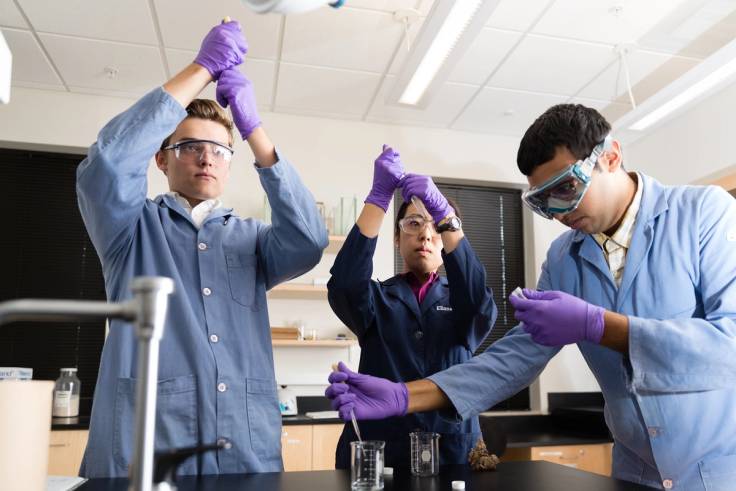
Solving Mysteries
Part of why Park is so adept at connecting with students who are ambivalent about their career paths is because it mirrors her own experience. As an undergrad at an all-women’s liberal arts school, Park started out pursuing the medical degree her parents envisioned for her. It was a path tinged with obligation, and she just wasn’t as passionate about it as she wanted to be.
“But then as I explored topics in my first organic chemistry class,” she explains, “I started to see this idea of pasting together a puzzle and the fun behind that. That mystery started to get unraveled. What started out as an obligation suddenly got me really excited. So I shifted gears and declared a major in chemistry.”
Park went on to get her PhD in chemistry, where she started learning more about the potential of nanotech and applications in improving medicine and sports equipment—like the way it has enhanced the strength of bike frames but also made them lighter.
“It piqued my interest,” she says, “and allowed me to explore things I was passionate about through the STEM lens I knew.”
Now, as a teacher to students who may feel the same family pressures, Park says she’s able to provide guidance rooted in understanding.
“My experience helps me navigate the dynamics of how family factors into career decisions,” she says. “At the end of the day, I want to make sure all my students understand that I’m trying to give guidance that is the best fit for them while respecting the culture they come from and familial authority.”
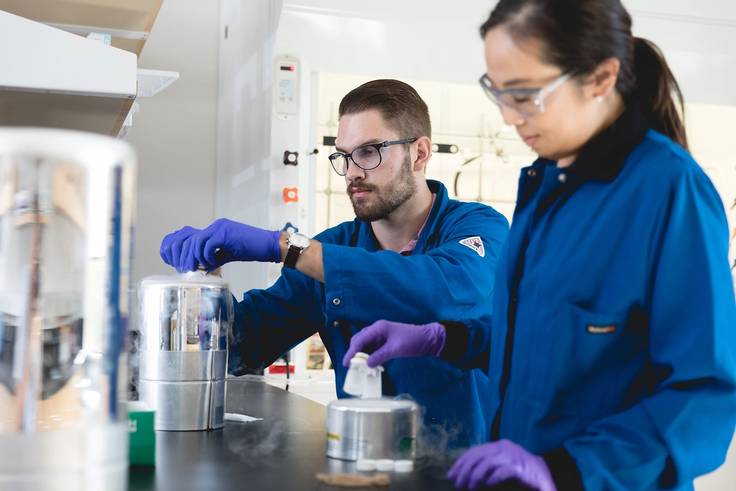
Good Learning Habits
Park isn’t the kind of professor to get bogged down in the answers you might find on a specific test; she’s more interested in deep comprehension and problem solving. Her goal is to provide every student with personalized attention tailored to their unique journey.
“Dr. Park not only wants her students to be successful, but also to prosper and enjoy what they do outside the classroom,” says chemistry major Tyler Hart ’24, who will join Park’s research lab this summer. “I’ve never felt any hesitation to reach out for advice and resolution. She is so accessible.”
Grundler says that communication was a key focus of his class time with Park as he thrived in the seminar-style model that mimics the experience of graduate school. And her support didn’t just extend to the curriculum—she really helps prepare her students for what’s next. He remembers being assigned a research topic and then participating in a mock interview, with Park playing the part of the journalist.
“I see my peers in grad school now who are comfortable doing the science or the research, but a lot of them didn’t learn how to communicate the research to different audiences.”
For Park, teaching content is important, but it’s more important to make sure her students have the right tools to approach a new problem, especially given the amount of information swirling around at any given time—whether it’s in a textbook or on YouTube.
“Even if I didn’t teach a specific topic in class, I want to know my students have the courage to look it up and the tenacity to work through the problems that are out there.”
Modeling Global Citizenship
In 2022, Park completed a semester working with the Department of Chemistry at University KwaZulu Natal in Durban, South Africa, through the esteemed Fulbright program. As a guest lecturer, she taught general chemistry courses and hosted teacher workshops to help faculty integrate more active learning into large-size classrooms.
Park says it was different from Rollins because the public university encompasses an undergraduate-to-graduate journey. She helped devise ways to connect the curriculum to real-world applications—for example, how nanotech topics can improve the design of solar cells. Park’s experience in South Africa was informed by her philosophy of both teaching and reinforcing positive learning habits that translate beyond one class.
“I helped make an active connection between what students learned in undergrad to what they’re doing in grad research,” she says. “Unsurprisingly, research at the graduate level is driven by a strong undergrad foundation.”
And just as she hopes for her students, Park’s learning extended beyond the classroom.
“I spent eight months in South Africa, and in a lot of ways, I’m still digesting my experience,” she says. “It was humbling in a lot of ways. As a faculty member who has traveled internationally, I think global citizenship means more than traveling. It means actually living there and immersing yourself in the culture—really in whatever it is that you’re doing. And that’s what I try to impart to my students.”
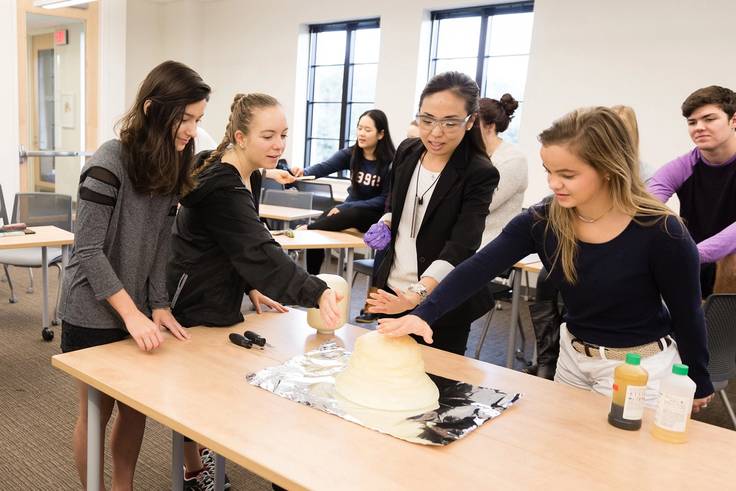
Professor Park’s 5 Coolest Classes
- RCC 100: Chemistry of the Nanoworld
- CHM 120/121: Chemistry I and II
- RFLA 200S: Chemistry of Nanomaterials
- CHM 320: Analytical Chemistry
- CHM 460: Nanotechnology
Fun Facts about Professor Park
- First-generation Korean American who grew up with values from both cultures
- Frequently organizes outdoor adventures like rock climbing with her students
- Speaks English, Korean, and Spanish
- First time she lived outside the U.S. was for the Fulbright assignment in South Africa, where wild monkeys regularly visited her apartment in search of food
- Favorite Korean dessert is patbingsoo
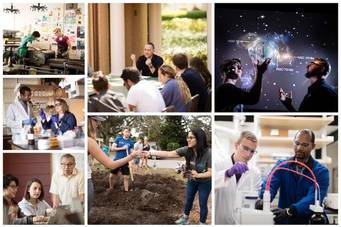
Meet Your Mentors
Learn more about Rollins’ expert faculty and our unique mentorship model by scheduling a visit to campus today.
Read More
July 08, 2024
Gunter’s Book on Climate Change Receives Multiple Awards
Political science professor Mike Gunter’s book Climate Travels recently won awards from Foreword magazine and the American Library Association.
June 27, 2024
Lahlou ’24 Earns Boren Scholarship
Adam Lahlou ’24 has earned a Boren Scholarship, a prestigious award reserved for students who intend to pursue careers in federal national security.
June 17, 2024
A Path to Purpose
Falecia Williams ’91 expanded her world by earning a Rollins degree. Now, she is working to expand the worlds of thousands of college students.
